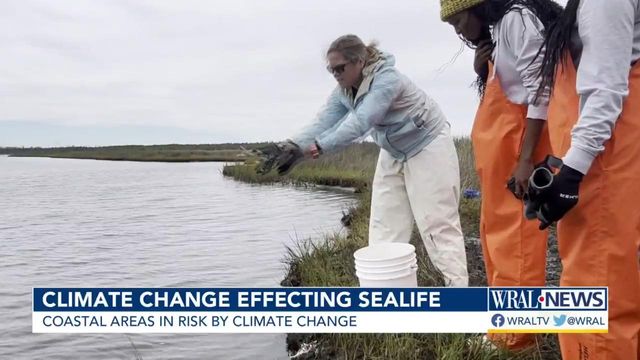NC seafood could become more expensive - or unavailable - as ocean temperatures increase
You may not live near the ocean, but rising sea levels and warming water temperatures could impact your next seafood dinner.
Posted — UpdatedYou may not live near the ocean, but rising sea levels and warming water temperatures could impact your next seafood dinner.
Craving oysters, flounder or Atlantic cod? Certain seafood options may cost you quite a bit more – or not be available at all.
Almost all of the heat caused by greenhouse gases is absorbed by the ocean, and water temperature increase is accelerating. The rate of warming has doubled from levels in the 1960s.
As our oceans evolve, with changes in temperature, volume, and water quality, the marine life that calls them home must adapt. This means some of the fish that call North Carolina's coast home may migrate – or die off.
"We see warming water temperatures and that causes fish to move into areas that they may not have been before," says UNC Institute of Marine Sciences professor Janet Nye.
Researchers and anglers are discovering new tropical species making their way into North Carolina waters. Other populations, including grouper and flounder are decreasing. Plus, seasons are stretching, with some fish arriving earlier in the spring or staying later in the fall due to warming water.
"At the fish market you might not see Atlantic cod, for example," says Nye. "And now you might be seeing black sea bass or Atlantic croaker."
According to an NC State study, the North Carolina seafood industry contributes nearly $300 million to the state’s economy.
Researchers and shellfish growers say this oyster season has been especially brutal, seeing mass oyster mortalities from Carteret to Onslow county, with severe losses of more than 90% at many sites.
Some seasonal loss is expected, but this year’s die-offs appear to be more severe and widespread – shuttering the supply.
"You could go to a bar in Charlotte and eat oysters on the half shell," says Nye. "That may become harder to do, the oysters are going to be more expensive."
Warmer temperatures could also mean a more welcoming environment for bacteria – and a higher health risk for consuming raw seafood.
The prevalence of diseases may not cause harm to humans, but can cause harm to the organism.
The fragile underwater landscape is swimming towards a chilling future if trends continue, according to Nye.
{A: KEN HALANYCH/EXEC. DIRECTOR} {126-136}
Related Topics
• Credits
Copyright 2024 by Capitol Broadcasting Company. All rights reserved. This material may not be published, broadcast, rewritten or redistributed.





